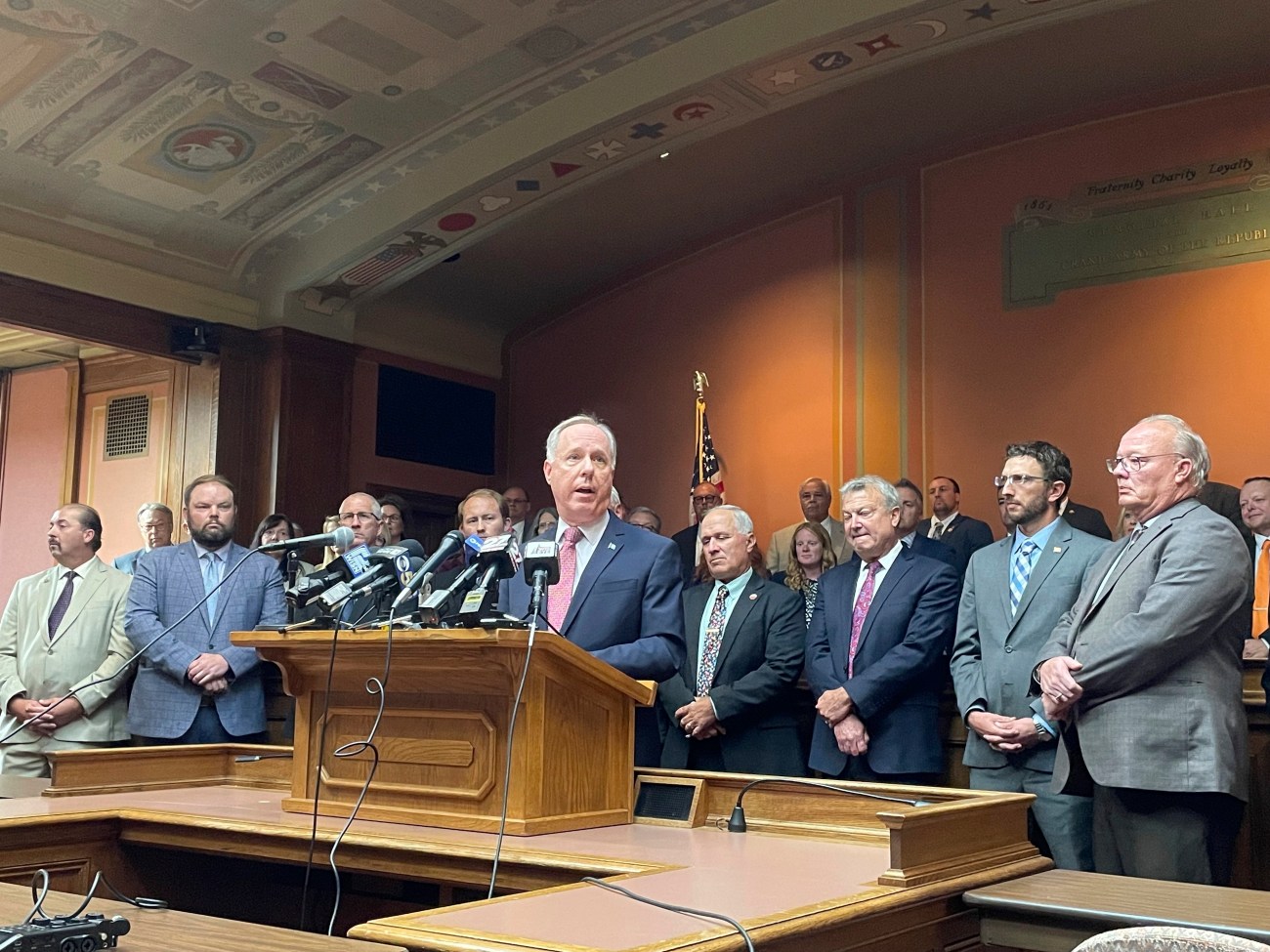
Meagan Wolfe, left, and Janet ProtasiewiczMother Jones illustration; AP
On Thursday, Republicans in the Wisconsin state senate voted to oust the nonpartisan administrator of the state’s election commission, Meagan Wolfe, in a bid to give election deniers and conspiracy theorists more control over how elections are run in the state. That follows threats by Republican legislative leaders to impeach newly elected state Supreme Court Justice Janet Protasiewicz before she has even ruled on a case so that the court’s new 4-3 liberal majority will be unable to strike down the heavily gerrymandered maps that have been integral to the GOP’s stranglehold over the legislature for the past decade-and-a-half.
These moves are the latest in a long line of anti-democratic actions taken by Wisconsin Republicans over the past 12 years that show the lengths they will go to topple basic democratic norms to maintain their grip on power. Democrats have won 14 of the past 17 statewide elections in Wisconsin, but Republicans’ seemingly voter-proof majorities in the legislature, as a result of the skewed maps passed by the GOP in 2011 and 2021, have allowed them to repeatedly thwart the will of a majority of voters and undercut the victories of Democratic candidates. In 2022, Democratic Gov. Tony Evers won re-election with 51 percent of the vote, but Republicans retained 65 percent of seats in the state assembly and 67 percent in the state senate, gaining a supermajority in the senate and coming just two seats short of a supermajority in the assembly, which would have allowed them to override the governor’s vetoes and make him functionally irrelevant.
Since 2011, Republicans have made Wisconsin their laboratory for dismantling democracy. Their efforts include passing some of the country’s most gerrymandered maps, enacting harsh voter suppression measures, dismantling the state’s campaign-finance system, repealing collective bargaining rights for politically powerful unions, stripping power from Evers and Attorney General Josh Kaul during a lame-duck session after the 2018 election, and authorizing a sprawling investigation into the 2020 election that amplified discredited conspiracy theories. But even for Wisconsin Republicans, the push to oust the state’s top election official and sideline a progressive judge just months into her 10-year term represent a dramatic escalation of their anti-democratic tactics, showing how far they’ll go to subvert fair elections in 2024.
“Going back to 2011, there is such a long laundry list of pretty amazing things that they’ve done,” says Jay Heck, executive director of Common Cause Wisconsin. “And it’s almost like, what else could they do? And then they come up with something like this.”
The moves also reflect how lies about the 2020 election continue to shape the modern GOP. The attempt to oust Wolfe, a highly respected election administrator, have been driven by Republicans who tried to overturn and decertify the 2020 election. They blame the election commission’s decisions to loosen voting laws during the pandemic—such as sending absentee ballots to nursing home residents instead of election deputies to oversee in-person voting—for Trump’s 20,000-vote loss in the state, despite multiple investigations showing no evidence of fraud in 2020. “I don’t call for Meagan Wolfe’s ouster,” one election denialist said at a legislative hearing last week. “I call for her arrest.”
Ben Wikler, chair of the Wisconsin Democratic Party, says the impeachment of Protasiewicz—which would effectively nullify more than a million votes she received in April 2023—is comparable to the effort to invalidate millions of ballots cast for Joe Biden in 2020, including in Wisconsin, which culminated in the January 6 insurrection.
“The impeachment scheme is a sledgehammer blow against the foundations of our democracy,” Wikler says. “It’s an attempt to overturn an election through raw legislative power in defiance of our Constitution and would effectively end the judiciary as a co-equal branch of government.”

Republican Wisconsin Assembly Speaker Robin Vos announces plans to create a new redistricting process in the battleground state ahead of the 2024 election on Tuesday in Madison, Wis. The move attempts to preempt a ruling on redistricting cases by the state Supreme Court’s new liberal majority.
Harm Venhuizen/AP
Amid public outcry and pressure from moderate Republicans, earlier this week GOP Assembly Leader Robin Vos abruptly changed tactics and endorsed an “Iowa-style nonpartisan redistricting” model to draw new political districts, an idea he has repeatedly rejected in the past. It was yet another attempt by Republicans to prevent the Wisconsin Supreme Court from striking down the gerrymandered 2021 maps. But the process envisioned by Vos is not as independent as it sounds. If the legislature rejects the maps drawn by the Legislative Reference Bureau, nonpartisan staff who work for the legislature, on two occasions, Republicans will have the power to draw their own partisan maps, which Heck says is “absolutely” Vos’ goal. Vos introduced the proposal Tuesday with no advance warning and the legislature plans to pass it on Thursday.
“The fact that Vos felt compelled to introduce this measure without consultation with any reform organizations like Common Cause Wisconsin and with no Democratic support and to immediately bring it to the floor of the Assembly without a public hearing or discussion is indicative of the disingenuous nature of this political stunt,” Heck wrote in email.
Evers immediately panned the proposal. “Republicans are making a last-ditch effort to retain legislative control by having someone Legislature-picked and Legislature-approved draw Wisconsin’s maps,” the governor said in a statement. “That is bogus.”
In response, Vos said Wednesday he was creating a panel of three former state Supreme Court justices (without naming them) to look into the criteria for impeaching Protasiewicz, suggesting that the unprecedented step is far from off the table.
Those justices, whoever they may be, will have a hard time coming up with any legitimate reason to impeach Protasiewicz. Impeachment for civil officers is reserved only for “corrupt conduct in office, or for crimes and misdemeanors” and has been seldom used against judges in Wisconsin. Only one judge has been impeached by the legislature since 1853. His alleged offense was bribery, and he was acquitted.
Republican leaders claim Protasiewicz should recuse herself from lawsuits filed in August challenging the state’s legislative maps because she called those maps “rigged” during her campaign and took $10 million in campaign funds from the state Democratic Party, even though it is not a party to the cases.
The US Constitution “does not allow a judge to sit on a case when her participation creates a serious risk of actual bias or prejudgment of the merits,” legislative Republicans argued in a legal brief before the Wisconsin Supreme Court seeking her recusal.
But conservative justices on the Wisconsin Supreme Court, when they were in majority, crafted the state’s recusal rules and refused to step aside in cases involving their financial backers. The court in 2010 adopted recusal standards written verbatim by the Wisconsin Realtors Association and Wisconsin Manufacturers & Commerce, two of the state’s largest business interests, who had generously supported conservative candidates for the bench. They stated that justices did not have to recuse themselves in cases involving campaign contributors.
In 2015, the Wisconsin Supreme Court heard a case concerning whether Governor Scott Walker, during his 2012 recall election, had illegally coordinated with outside conservative groups, such as WMC and Wisconsin Club for Growth, which had spent millions of dollars on Walker’s behalf and had worked closely with his campaign in alleged violation of Wisconsin’s campaign finance laws. The groups under investigation had spent $8 million to elect the court’s four conservative justices, but none recused from the case. The conservative majority subsequently shut down the investigation and fired the prosecutor leading the case, rescuing Walker and his outside allies from legal trouble.
Two years later, the conservative justices again rejected calls from 54 retired judges to recuse themselves in cases involving campaign contributors. ‘“Every judge in Wisconsin should be offended by this. It attacks their integrity and character,” said Justice Rebecca Bradley. Nevertheless, she recently called for her new colleague, Protasiewicz, to recuse herself from the gerrymandering case.
Nor have the conservative justices been shy about making their positions clear on hot-button issues. Conservative justice Brian Hagedorn called Planned Parenthood a “wicked organization more committed to killing babies than to helping women.” Bradley once likened abortion to the Holocaust and slavery. Neither has said they will recuse themselves from cases involving abortion, including a pending challenge to the state’s 1849 abortion ban. The Wisconsin Judicial Commission, which investigates judges, has already dismissed complaints that Protasiewicz violated the state’s judicial code of ethics for comments she made during the campaign.
Moreover, the US Supreme Court, in a decision from 2002 written by Justice Antonin Scalia, ruled that judges have a First Amendment right to publicly state their positions on controversial legal issues while campaigning for election. “We have never allowed the government to prohibit candidates from communicating relevant information to voters during an election,” Scalia wrote.
Based on these precedents, there’s no basis for Protasiewicz to recuse herself from the gerrymandering cases, let alone be subject to the extraordinary and virtually unprecedented nature of an impeachment inquiry. “The idea that she should recuse here is itself a legal stretch,” says Robert Yablon, a law professor at the University of Wisconsin-Madison and co-director of the State Democracy Research Initiative. “And the idea that then a failure to recuse would be impeachable also seems like a stretch. I’m not aware of any other judicial impeachment anywhere in the country that was premised on a non-recusal from a case involving campaign supporters or campaign statements.”
But as is so often the case, power—not the law—is what Republicans care most about. A simple majority of the assembly is all it takes to impeach Protasiewicz, which would bar her from official duties until the senate holds a trial, where a two-thirds majority (which the GOP possesses because of gerrymandering) is required to convict. If she is convicted, Evers could name an immediate replacement. But if the senate refuses to hold a trial, Protasiewicz could be sidelined indefinitely after the articles of impeachment pass the assembly. Whatever the eventual outcome, the GOP could run out the clock, preventing the gerrymandered maps from being struck down in a timely manner and new maps taking effect for 2024. “The mere act of passing an impeachment resolution serves their purpose, because it delays the redistricting lawsuit,” says Heck.
Any attempt to impeach Protasiewicz would swiftly be challenged in federal or state court. But Democrats are also looking at other options in case Vos moves forward with impeachment. She could resign and Evers could immediately appoint her successor, which could still lead to the gerrymandered maps being struck down. If the assembly impeaches her but the senate doesn’t act, Evers could argue he has the power to appoint a temporary replacement. Protasiewicz could play hardball and argue that the entire impeachment effort is unconstitutional and refuse to step aside. “It starts to get into constitutional crisis kind of territory,” says Yablon.
In the meantime, Democrats last week launched a $4 million campaign to pressure legislative Republicans, who have been impervious to public opinion in the past, to back down. It seems to be having an impact. “Republicans are quickly discovering that their impeachment is wildly unpopular with the general public,” Wikler says. New polling from A Better Wisconsin Together, a liberal group, finds that Wisconsinites oppose impeaching Protasiewicz by a 24-point margin. Twelve assembly Republicans and six Senate Republicans represent districts Protasiewicz won, Wikler notes. Already one of them, Rep. Scott Johnson, who won by 267 votes in 2022, has come out against impeachment.
“The people of Wisconsin have historically shown that they do not support uprooting a duly elected official on the sheer basis of political agreement,” he says. “Our court has shifted in a new direction, which is the consequence of an election.”
The same disregard for precedent has shaped the GOP’s effort to oust Wolfe. After the Wisconsin Supreme Court shut down the probe into Walker and his outside allies in 2015, the legislature obliterated Wisconsin’s campaign finance system, which had been a model for the country. In the process, they axed the highly regarded panel of retired judges that oversaw election administration and campaign finance laws in the state, replacing it with the Wisconsin Elections Commission, which was modeled after the Federal Election Commission. Wolfe was nominated by Republicans as its administrator and unanimously confirmed by the state senate in 2019.
Earlier this year, under pressure from election deniers, the commission deadlocked on party lines over whether to appoint Wolfe to a new term. But the legislature’s nonpartisan attorneys have said that only a majority vote can officially reappoint Wolfe; in the absence of that, she can stay in her job and the state senate does not have the power to remove her. Indeed, Republicans have used that same holdover provision to prevent Evers from filling key administrative positions—a tactic upheld by the conservative majority on the Wisconsin Supreme Court last year.
The effort to oust Wolfe will result in litigation that will almost certainly end up, fittingly, at the Wisconsin Supreme Court.
Both the removal of Wolfe and the attempt to sideline Protasiewicz, through impeachment or new maps drawn by the legislature, are geared toward giving Republicans an electoral advantage in 2024 by undermining fair elections.
“They want to put in place someone who is more compliant to their desire for a Republican victory in 2024,” Heck says of the vote to oust Wolfe.
The bid to remove Protasiewicz could not only torpedo litigation that would result in fair legislative maps in 2024, but it could also embolden the GOP to take the more extreme step of trying to overturn another election. It’s easy to forget that Trump’s lawsuit to invalidate the 2020 election in Wisconsin came just one vote short before the Wisconsin Supreme Court. Afterwards, Trump supporters called for Hagedorn, the conservative swing justice who sided with liberals to reject the lawsuit, to be recalled from office.
“If this assembly believes that it can simply impeach and suspend Supreme Court justices to change Supreme Court decisions, then there’s nothing to stop them from doing the same thing to another justice in a Trump versus Biden 2.0 legal scenario,” says Wikler.
At the root of these disputes are the original sin of GOP gerrymandering, which has given Republicans an inflated majority that they will go to any length to preserve.
“There’s a major irony here,” says Yablon. “The only reason that they are in a position to potentially impeach her is because of the maps that they now fear are going to be in jeopardy if she hears the redistricting case. It’s just a vivid illustration of the insidious nature of gerrymandering.”
This story was updated after the Wisconsin Senate voted to remove Meagan Wolfe on Thursday afternoon.
Top image: Mother Jones illustration; Ruthie Hauge/Wisconsin State Journal/AP; Wong Maye-E/AP; Morry Gash/AP
















